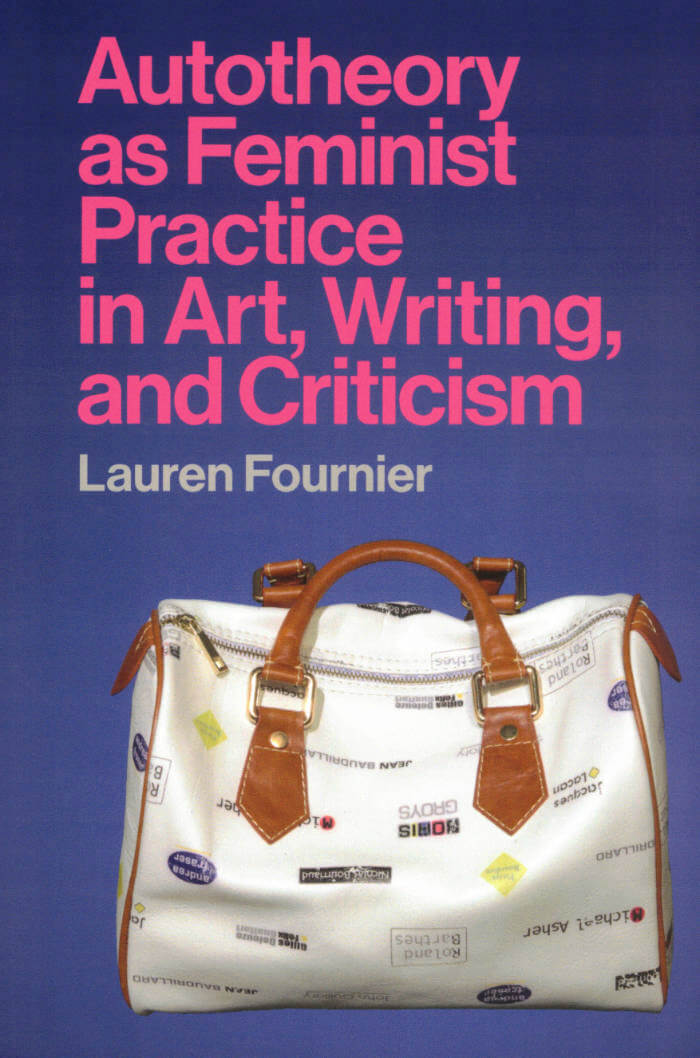Lauren Fournier
Lauren Fournier

Autotheory as Feminist Practice in Art, Writing, and Criticism
Autotheory—the commingling of theory and philosophy with autobiography—as a mode of critical artistic practice indebted to feminist writing and activism.
In the 2010s, the term “autotheory” began to trend in literary spheres, where it was used to describe books in which memoir and autobiography fused with theory and philosophy. In this book, Lauren Fournier extends the meaning of the term, applying it to other disciplines and practices. Fournier provides a long-awaited account of autotheory, situating it as a mode of contemporary, post-1960s artistic practice that is indebted to feminist writing, art, and activism. Investigating a series of works by writers and artists including Chris Kraus and Adrian Piper, she considers the politics, aesthetics, and ethics of autotheory.
Fournier argues that the autotheoretical turn signals the tenuousness of illusory separations between art and life, theory and practice, work and the self—divisions long blurred by feminist artists and scholars. Autotheory challenges dominant approaches to philosophizing and theorizing while enabling new ways for artists and writers to reflect on their lives. She argues that Kraus's 1997 I Love Dick marked the emergence of a newly performative, post-memoir “I”; recasts Piper's 1971 performance work Food for the Spirit as autotheory; considers autotheory as critique; examines practices of citation in autotheoretical work, including Maggie Nelson's The Argonauts; and looks at the aesthetics and ethics of disclosure and exposure, exploring the nuanced feminist politics around autotheoretical practices and such movements as #MeToo. Fournier formulates autotheory as a reflexive movement, connecting thinking, making art, living, and theorizing.
And more

Worms #5 'Impurity'
In this issue, Worms explores New Narrative alongside writers working today that incorporate some of it’s themes. The cover star Saidiya Hartman talks with Rhea Dillon about the limits and processes of creating stories from the archive, while Camille Roy and Dodie Bellamy give insight into New Narrative from their experiences involved in the movement. Savannah Knoop tells about their life playing the character of J.T Leroy, while Calla Henkel delves into ideas of using other people’s narratives as our own. There’s lots of gleaning, lots of stealing and lots of hard truths coming from the human body. There is poetry and fiction and all of the usual bits, as well as an experimental cut up piece demonstrating the appropriation method that Kathy Acker (via William Burroughs) used in so much of her work. Many more worms to be found in these pages.
Featuring:
Saidiya Hartman, Camille Roy, Dodie Bellamy, Lynne Tillman, Estelle Hoy, Rhea Dillon, Savannah Knoop, Lauren Fournier, Madelyne Beckles, Joanna Walsh, Anne Turyn, Cristina Morales, Calla Henkel, Jenny Zhang
Contributors:
Zara Joan Miller, Haydee Touitou, Nicole Della Costa, Cecilia Pavón, Valentina Von Klencke, Feyi Adegbite, Alice Platti, Victoria Campa, Alice Butler, Clemmie Bache, Caitlin Mcloughlin, Jack Stuart Mills, Honor Weatherall, Arcadia Molinas, Aimee Ballinger, Wes Knowler, Eleanor Wang, Katy Dadacz, Olive Couri, Rachel Cattle, Isabelle Bucklow, Sarah Bodri, Hope Roafl, Maura Sappilo, Jodie Hill, Jacqueline Ennis Cole, Mary Watt, Delia Rainey.